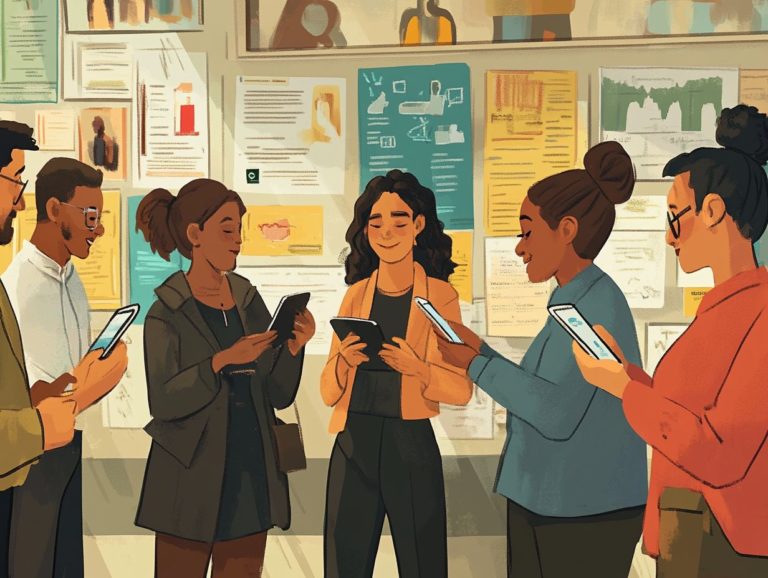5 Ways to Stay Informed About Your Rights
Understanding your rights is essential in today’s rapidly changing landscape. Engaging with current events, following legal experts, or attending workshops equips you with the knowledge needed to protect yourself and those around you.
This article delves into five effective strategies for staying informed about your rights and navigating potential violations. By recognizing the most common infringements and encouraging others to stay informed, you ll uncover practical steps to become an active participant in safeguarding your freedoms.
Contents
Key Takeaways

- Know your rights to safeguard yourself!
- Stay updated on current events and changes in laws and policies!
- Follow legal experts and organizations on social media for updates!
1. Know Your Basic Rights
Understanding your fundamental rights is crucial as you grasp the important aspects of social work and social policy. These rights serve as the cornerstone for your advocacy efforts, aimed at enhancing the lives of clients grappling with mental illness, substance abuse, and teen pregnancy across diverse communities, from California to Nigeria.
This knowledge enables you to effectively support vulnerable populations, ensuring they receive fair treatment and access to vital resources.
By familiarizing yourself with the provisions outlined in the Universal Declaration of Human Rights, you can pinpoint systemic barriers such as those contributing to homelessness or obstructing economic justice and develop informed strategies to tackle these issues.
With this understanding, you re encouraged to adopt a proactive stance, advocating not only for immediate needs but also for long-term societal transformations that uphold dignity and human welfare. Your advocacy plays a crucial role in shaping policies that amplify marginalized voices and foster sustainable community development.
Now, let’s see how staying updated on current events can enhance your advocacy.
2. Stay Updated on Current Events
Staying updated on current events is essential for you as a social worker or grassroots activist. It enables you to make informed decisions and engage effectively in community organizing initiatives that tackle pressing issues like climate justice and economic fairness.
Utilizing a range of news sources local newspapers, reputable online platforms, and dedicated nonprofit organizations gives you a well-rounded perspective on social issues.
Social media can be a powerful ally for real-time updates, connecting you with diverse viewpoints and fostering grassroots campaigns. Community forums also provide fertile ground for rich discourse, allowing for shared experiences and collective brainstorming.
Knowing current events shapes social policy and empowers you to make a difference!
This approach leads to more effective and culturally responsive interventions, enhancing your impact in the community.
Next, let’s explore how following legal experts can further your knowledge.
3. Follow Legal Experts and Organizations on Social Media
By following legal experts and organizations on social media, you can elevate your advocacy efforts in social work. This practice provides valuable insights into the latest legislation while networking with like-minded professionals focused on educational opportunities.
This digital landscape serves as more than just a platform for updates; it cultivates community engagement, enabling social workers to discuss pressing issues that impact their field.
For example, organizations like the National Association of Social Workers (NASW) often share timely updates regarding policy changes, while legal experts provide analyses that clarify the implications for practice.
Platforms like Twitter offer you the chance to connect with peers and thought leaders, making discussions around advocacy strategies more effective. Engaging with these channels enables you to stay informed and mobilize resources efficiently, ensuring that you can advocate for necessary changes in legislation and public policy.
In conclusion, take these steps to empower yourself and others in advocating for your rights!
4. Attend Workshops and Seminars

Attending workshops and seminars offers vital educational opportunities for social workers. This enhances your ability to advocate for clients and engage in community organizing.
These events cover diverse topics, including:
- Trauma-informed care
- Cultural competency
- Policy advocacy
Each area helps tackle complex community challenges. Workshops are interactive, allowing you to share experiences and collaborate on solutions.
Seminars often feature expert speakers presenting the latest research. Participating in these gatherings expands your skills and professional network.
5. Consult with a Lawyer
Consulting a lawyer is crucial for social workers and clients. It helps understand complicated laws and enhances advocacy against issues like homelessness.
Legal consultation is invaluable in many scenarios. Whether dealing with family disputes or employment discrimination, legal expertise reveals overlooked options.
When social work and law converge, you advocate for systemic change. Collaborating with lawyers empowers clients and amplifies their voices in critical discussions.
What Are Your Rights as a Citizen?
As a citizen, your rights under the Universal Declaration of Human Rights offer essential protections. These shape social policy and advocacy initiatives.
These rights guarantee dignity and equity. They also guide governments and organizations in developing policies for social welfare.
For example, the right to health influences access to mental health services. Recognizing these rights strengthens advocacy efforts for a fairer society.
How Can Staying Informed Help Protect Your Rights?
Staying informed about events and legislation is vital for social workers and their clients. This vigilance enhances advocacy efforts and community responses.
By monitoring developments like the Mental Health Reform Act, you grasp policy nuances. This helps tailor interventions to new support systems.
Awareness of legislative changes, such as the Affordable Care Act expansions, allows informed discussions with clients. This knowledge leads to better decisions in navigating social services.
What Are the Most Common Violations of Rights?

Common violations of rights can appear in various forms, particularly impacting marginalized groups grappling with challenges such as mental illness, substance abuse, and homelessness. This reality underscores the urgent need for robust advocacy efforts in social work.
These violations often manifest as discrimination in accessing healthcare, insufficient support services, and even systemic neglect. All of these factors can worsen the difficulties faced by vulnerable populations.
By acknowledging these infringements, social workers are positioned to spearhead initiatives that not only raise awareness but also strengthen community organizing efforts. Such collective action creates vital connections among affected individuals, enabling them to find their voices and advocate for policies that ensure equitable treatment.
Informed advocacy serves as a catalyst for mobilizing communities, fostering solidarity and support networks that uplift those who have been marginalized. This ensures that their rights are not only recognized but also respected.
How Can One Stay Informed About Changes in Laws and Policies?
Staying informed about changes in laws and policies is crucial for anyone involved in social work and advocacy. You can achieve this through a blend of educational opportunities, networking, and engaging with legal resources.
To effectively navigate the ever-evolving landscape of legislation, consider participating in legal workshops and seminars events where legal experts discuss important changes to laws. These provide valuable insights into recent reforms and case studies.
Joining professional organizations related to social work will give you access to newsletters and publications that spotlight current legal trends. Don t underestimate the power of social media; it can be an invaluable tool. Many experts and organizations share insights and updates in real-time, making it an excellent resource for quick information.
By actively engaging with these methods, you can position yourself to better understand and respond to the legal shifts that impact your work.
What Are the Benefits of Knowing Your Rights?
Knowing your rights isn t just important; it s empowering! It enables you to advocate effectively for yourself and others, fostering a sense of agency that is crucial in social work and community organizing aimed at achieving economic justice.
This enablement not only enhances your personal autonomy but also cultivates a shared awareness that can lead to real change within communities.
For instance, consider programs that educate low-income families about their tenant rights; these initiatives have led to a significant increase in the number of families retaining stable housing.
Understanding your rights strengthens community ties as people unite to support each other in advocacy. A striking example is a grassroots organization that successfully campaigned for local policy changes after residents learned how to voice their concerns effectively.
Such knowledge transforms fear into action, enabling communities to stand united against injustices.
How Can One Encourage Others to Stay Informed About Their Rights?
Encouraging others to stay informed about their rights is an essential part of advocacy, and you can accomplish this through community organizing, educational initiatives, and connecting with grassroots activists who are truly passionate about social change.
These strategies foster a collaborative atmosphere where individuals feel enabled to share their experiences and insights. Workshops become dynamic spaces for engaging discussions about legal rights, while thoughtfully designed social media campaigns can amplify these important messages to reach wider audiences.
Peer education is particularly impactful, as community members often connect more profoundly with those who share similar backgrounds. By weaving together these approaches, you can help cultivate an informed populace that actively engages in rights advocacy, ultimately contributing to a stronger and more aware society.
Frequently Asked Questions

What are some ways to stay informed about my rights?
1. Keep up with current events and news: Stay updated on local and global issues that may impact your rights. Consider exploring the top 5 apps to learn about your rights for more information.
2. Use online resources: Websites like government agencies and non-profit organizations offer information on laws and rights.
3. Attend workshops or seminars: Many organizations offer workshops on various rights-related topics.
4. Join advocacy groups: Being part of an advocacy group helps you stay informed about changes in laws and policies and enables you to take action to protect your rights.
5. Know your legal resources: Familiarize yourself with lawyers and legal help groups that can assist you if needed.
Why is it important to stay informed about my rights?
Staying informed ensures you are aware of any changes to laws and policies that may affect you. It also allows you to educate yourself on legal rights and protect yourself from potential violations.
Social media is a valuable source of information regarding your rights. Thousands of activists and organizations share critical news on social media every day.
How can I educate others about their rights?
1. Share information on social media: Use your platforms to share resources and educate your friends about their rights.
2. Organize workshops or events: Consider hosting a workshop to educate your community on specific rights-related topics.
3. Volunteer with advocacy groups: Volunteering allows you to directly help individuals understand their rights.
What should I do if I feel my rights have been violated?
If you think your rights have been violated, act quickly. Gather evidence immediately and seek legal help from a lawyer or a legal aid group to determine the best course of action.
Take action today! Stay informed and protect your rights.






